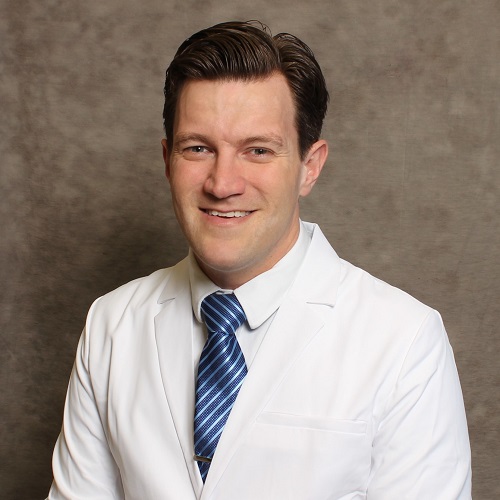Teaching Dignified Care: The Importance of LGBTQIA+ Health Care in Serving Patients
June 25, 2024
 Brian Tesler remembers when medical students were taught that only gay men got AIDS.
Brian Tesler remembers when medical students were taught that only gay men got AIDS.
It was one of the ways that misleading and biased sexual orientation and gender identity concepts had crept into the curriculum. That is why Tesler, MD, an assistant professor, has been charged with updating the College of Human Medicine’s curriculum. The tasks include things such as removing gender if unnecessary or adding inclusive, unbiased scenarios where appropriate to better serve LGBTQIA+ patients.
“We have to change our ways and change how we teach students as they go out into the world,” Tesler said. “One way we do this is by removing the overuse of gender in patient scenarios,” replacing it with more neutral language.
In some cases, gender can be discussed to help understand its applications and help learners understand the difference between sex and gender. Binary sex is used in teaching foundational anatomical differences between males and females. However, this must include the clear anatomical spectrum of variations, and that sex does not imply gender.
“Anatomy always was taught in a traditional binary manner,” Tesler said. “Either the patient was male or female.”
A patient might appear to be one gender by societal constructs, he said, but identify differently. Some babies are born with ambiguous sex, in which the external genitals are neither clearly male nor female. In the past, doctors performed surgery on these infants or told parents to raise them as girls, regardless of their genetic sex, often leading to anxiety, confusion and depression later in life.
Many LGBTQIA+ patients, uncomfortable talking with physicians about their sexual orientation, gender identity, or sexual activity, become marginalized and avoid seeking medical care.
“We don’t realize the power that puts upon us, where we can be the interaction that ends a person’s journey for health,” Tesler said. “If you’re not listening to your patients, you’re not serving them well.”
Tesler, a 2014 College of Human Medicine graduate and board-certified obstetrician gynecologist, returned to his hometown of Flint, where he joined the college faculty and the staff at McLaren Flint hospital.
In 2022, Wanda Lipscomb, PhD, senior associate dean for diversity and inclusion, and Jennifer Johnson, PhD, chair of the Charles Stewart Mott Department of Public Health, asked Tesler to update the curriculum, making it more compassionate for LGBTQIA+ patients.
The effort comes as some states around the country have passed laws curtailing transgender rights and creating non-inclusive and even threatening environments for members of LGBTQIA+ communities.
 Tesler already had considerable experience promoting inclusivity, having spent years traveling the country as Paging Dr. Rainbow and teaching medical students and providers about the importance of LGBTQIA+ health care.
Tesler already had considerable experience promoting inclusivity, having spent years traveling the country as Paging Dr. Rainbow and teaching medical students and providers about the importance of LGBTQIA+ health care.
Some physicians don’t see the need for using inclusive language, as they haven’t had issues or even seen LGBTQIA+ patients before, he said.
“That sentiment tells me you’re not looking out for the needs of your patients and most likely not creating an environment of trust for them to tell you about themselves,” Tesler said.
Today’s medical students are more receptive to his message, he said.
“It’s called dignified care,” Tesler said. “It should be part of every core course. If we’re not teaching good medicine for all the people out there, then we are doing a disservice.”
LGBTQIA+ patients who feel disrespected by physicians often avoid seeking medical care, he said, which can lead to serious health problems.
“We can’t ignore this anymore,” Tesler tells his students. “Don’t be that one person who causes patients to walk away from medicine.”
By Pat Shellenbarger
Read more
New scholarship supports students advocating for, working with the LGBTQIA+ community

